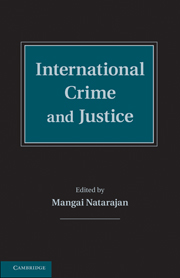Book contents
- Frontmatter
- Contents
- List of Figures
- List of Tables
- List of Contributors
- Foreword
- Preface
- Introduction
- Part I International Criminology
- Part II Law, Punishment, and Crime Control Philosophies of the World
- Part III Transnational Crime
- Part IV Organized Crime and Terrorism
- Part V International crime
- Part VI Delivering International Justice
- Part VII International Cooperation and Criminal Justice
- Part VIII International Research and Crime Statistics
- Part IX International research resources
- World Map
- Index
Part V - International crime
Published online by Cambridge University Press: 05 October 2014
- Frontmatter
- Contents
- List of Figures
- List of Tables
- List of Contributors
- Foreword
- Preface
- Introduction
- Part I International Criminology
- Part II Law, Punishment, and Crime Control Philosophies of the World
- Part III Transnational Crime
- Part IV Organized Crime and Terrorism
- Part V International crime
- Part VI Delivering International Justice
- Part VII International Cooperation and Criminal Justice
- Part VIII International Research and Crime Statistics
- Part IX International research resources
- World Map
- Index
Summary
After decades of deliberation, agreement was reached among the countries signing the Rome Statute in 1998 on the definition of international crimes that would fall under the jurisdiction of the International Criminal Court. These were considered to be the gravest crimes that threaten the peace, security, and well-being of the world. This definition covers specific crimes yet to be agreed upon, but it includes the following four core crimes: (1) the crime of genocide; (2) crimes against humanity; (3) war crimes; and (4) the crime of aggression. At the date of writing, more than half of the countries of the United Nations have now signed the Rome Statute and have begun to incorporate the crimes that it identifies into domestic legislation. This section provides brief descriptions of the four core crimes as a background to understanding the challenges in enforcing the Rome Statute.
The concepts of genocide, war crimes, and crimes against humanity have undergone considerable transformation since the end of World War II. Whether one examines the main elements of each crime, or the context in which they occur (wartime or peacetime, whether they are international or not), there is a discernible trend toward strengthening the protection of individuals and groups at the expense of state-centric interpretations of legal obligations (see Chapter 39 by George Andreopolous).
In respect of the four core crimes, however, there are many difficult questions to be resolved. For genocide, two of the important questions are“At what point do individual killings amount to genocide?” and “Does the crime of genocide always require it to be demonstrated that there was the intention to eradicate a particular ethnic or racial group?” Chapter 40 by Itai Sneh grapples with these and other questions while reviewing the history of genocide and considers recent advocacy and policy guidelines that are influencing emerging international law concerning intervention in acts of genocide.
- Type
- Chapter
- Information
- International Crime and Justice , pp. 297 - 298Publisher: Cambridge University PressPrint publication year: 2010

